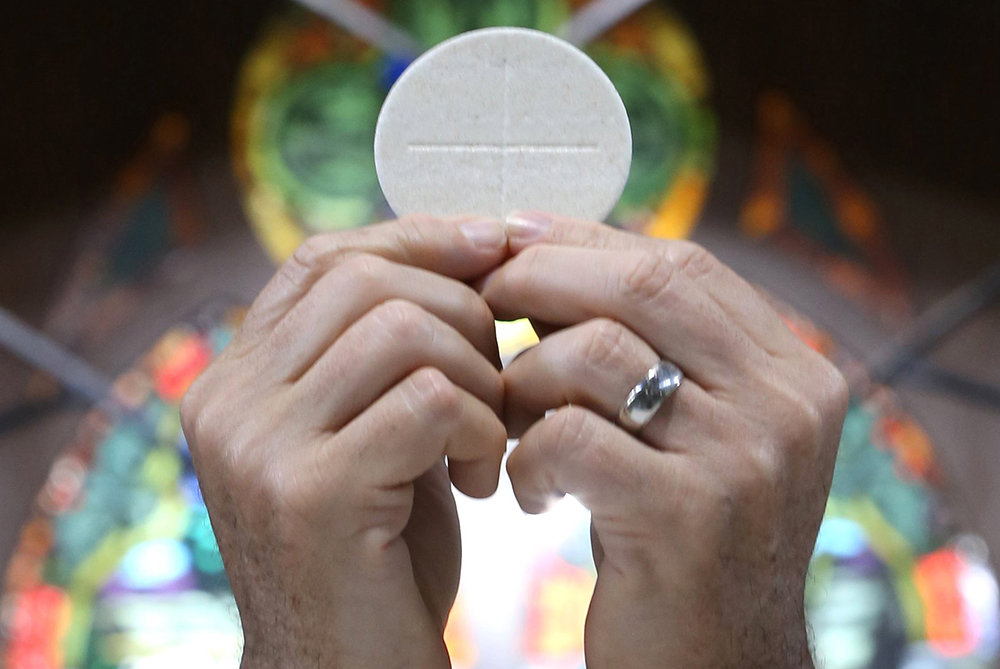
A priest raises the Eucharist in this illustration. (OSV News/CNS file/Bob Roller)
Editor's note: In preparation for the National Eucharistic Congress July 17-21, Global Sisters Report is republishing this column on the importance of the Eucharist.
The three-year National Eucharistic Revival began in 2022 on the Solemnity of the Most Holy Body and Blood of Christ and will conclude in July 2024 with the National Eucharistic Congress. According to the National Eucharistic Revival website, the movement "is the joyful, expectant, grassroots response of the Church in the United States to the divine invitation to be united once again around the source and summit of our faith in the celebration of the Eucharist."
The word "revival" has an interesting ring of resuscitation. Nevertheless, the movement and concluding congress present the perfect opportunity for me to share my understanding of Jesus' real and active presence in Eucharist.
Let me say, first of all, that I have a strong belief in and reverence for the real presence of Jesus — and therefore God — in the bread and wine. Real, but not physical (they still look and taste like bread and wine). But as a sacramental action, the Eucharist goes much further than simply presence.
Advertisement
At every Eucharist, we first speak to God in reverence and praise; God speaks to us in the word, inviting us to align ourselves with God's plan for the world; we accept and give God praise and thanks (eucharistía in the Latin); and God unites with each one of us in Holy Communion.
The body of Christ, held before my eyes long enough for me to declare a sincere "amen," parallels the daily "I do" of matrimony. With confidence in God's help, I renew my loyalty to Christ's mystical body all over the world and take him, the love of my life, into my body, anticipating eternal union in God's beloved community.
While the earlier parts of the Eucharistic action have called for collective (common) prayer with a few pauses for individual reflection, Communion calls me to individual action and prayer as I receive and return to my place with Jesus Christ truly within me. My entire attention is on communing with him, as I kneel or sit, whatever my preference, and tune in to the Communion song and then the silence. I listen for not the tabernacle click, not the cleansing of the vessels, not the seating of the presider, but simply his invitation to draw the Communion Rite to a close in common prayer, "Let us pray."
Some parishes stand in unity while all are receiving, symbolic of their mystical unity as the body of Christ. Whatever the practice, after receiving we reverence the tabernacle of our own bodies, wherein the really present Jesus awaits our full and undivided attention. The final blessing will send us forth, fortified with the body and blood of Christ, to go and change the world — Ite, missa est! I am sent to do in my life what Jesus did in his. Go out of my way to help another person, another driver, someone in need — to recognize the dignity of every person I meet.
There exist many loftier ways of imparting Eucharistic theology and how it defines the church, but for me it is simply and profoundly my reliable, intimate connection with God as with a very dear friend. I pray that all Catholics might experience a "full, conscious, and active participation" during the Eucharist (Sacrosanctum Concilium 14). We need to build our relationship with Jesus, and there is no more effective means than the "source and summit of our Christian life," the celebration of the Eucharist.







